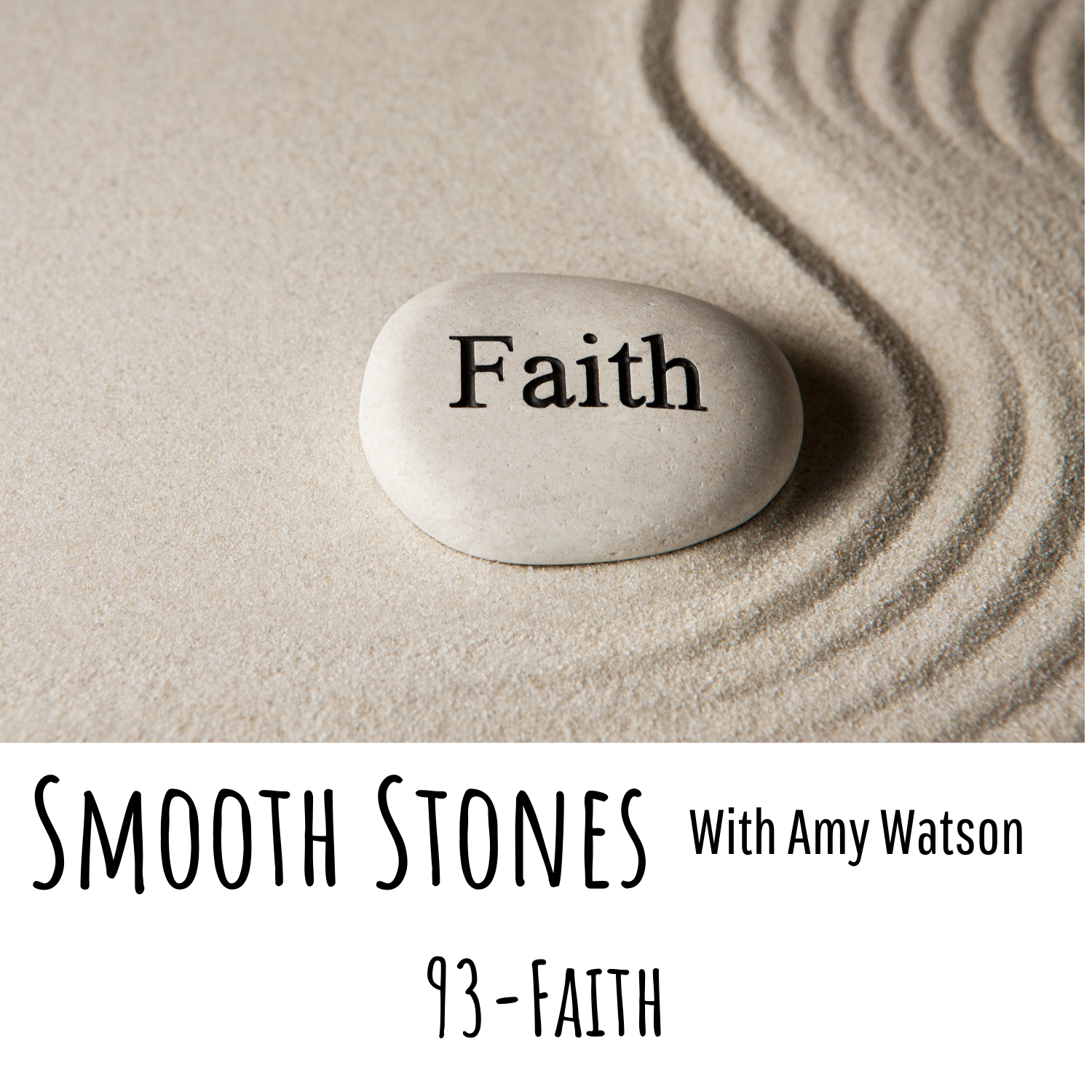Whether you had a strong faith before loss or just started searching when your baby died, faith is an important part of being a human.
In today’s episode we’re exploring what faith is , where it fits in the self coaching model and how you can find your way into alignment with your beliefs, especially if they’ve been shaken.
To schedule a free consult call, click HERE
Follow me on Instagram! @amy.smoothstonescoaching
Visit my website.
Photo by Canva
Music by ZingDog on Pond5
Transcription
Hey friends, I’m so happy to be talking with you, and I hope you’re having a great day and you’re getting that laundry folded, or you’re getting to carpool or whatever you do exercising.
As you’re listening to me, I wanna thank you as always for being here. For giving me a little bit of time with you, and I want you to know that I care about you and I think about you always. As I’m preparing this podcast, I wanted to ask you one little favor. If you love the podcast, will you review it?
Reviews, help people see that this is a great podcast and that it is helpful and it will help them find it. We all are live in a world of reviews. So when we see those five stars, we’re like, yeah, that’s, that’s the thing I want. So take a little bit of time and gimme a rating or review, and if you have friends who would benefit from this podcast, please share it with them.
I think that’s the most powerful thing we can do is share the things that help us with others. And your friends are gonna trust your. Recommendation. And so that’s really helpful for me too because I just wanna help all the lost moms. That is my goal, to just get this work and coaching out to everyone who needs it.
It’s just, I mean, it makes me so excited, and you can be a part of that by sharing this podcast. So thank you again for being here. All right, back in episode 65, we tackled the question, why do bad things happen to good people? Now, if you have wrestled with that question, definitely go and listen to that episode.
Today I wanted to talk about faith and how it fits in the self-coaching model. I am coming from a Western Christian background, but I always try my best to be inclusive of all belief systems. And if I mess up, I am sorry and you are welcome to email me and tell me how I can do a better job, but just do it, you know.
We’re just gonna be kind and compassionate with each other as we learn and grow. But right now we are in the season of April with Easter. We’ve got Passover, we’ve got Ramadan all happening at the same time. So I was really thinking about how Easter commemorates the death and resurrection of Jesus Christ.
The Passover remembers deliverance from death, and Ramadan emphasizes the power of fasting, prayer, and good works. And what most people of faith have in common is a belief that there is someone who oversees our lives, who I am going to call God. He created us and this world we live in, he gives us ways to live like commandments and guidelines, and he loves us and he wants us to come back and live with him.
In heaven or paradise or whatever you wanna call it. Our relationship to him is based on faith because we are separated from him. It says in Hebrews now, faith is a substance of things hoped for, the evidence of things not seen. If we knew everything about God, we would not need faith. We would just know, but we can’t know it all here on earth.
So we have to live by faith, especially when it comes to our babies. Going through the loss of a loved one really brings us to search for answers. So I wanna talk about faith and the model. Where does faith go in the model? The model is the main tool I use in coaching, along with so many other things. But the model is made up of circumstances, thoughts, feelings, actions, and results.
So faith can go a lot of places. Let’s talk about it, and then you could decide what helps you the most with your faith. First, it can go in the circumstance line. You can do a model on your faith, put what you believe, something you want to believe in, or something you are struggling with in the circumstance.
Then you can write down all the thoughts you have about it. For example, a skeptic might put God in the sea lion and have the thought. Only sheep will believe that, and that thought would affect the rest of his model. Maybe it’s your church or a tenant of your faith that you wanna examine. Put it in the sea line.
Now remember, if it’s in the sea line, it needs to be factual and objective. Now what about the thought line? This is where most people, I think would put faith because it is our beliefs. And that can be useful as well. Our beliefs are so powerful. Even the statement I have faith, or I believe some people would say, well, that’s a fact, so it should be a circumstance.
But it’s really hard to quantify or measure. So it’s usually gonna be a thought. Many of us believe that we have faith, but when hard times come, That might change, and that’s okay. As we break this down into each of these parts, I want you to remember that the model is a tool. It is one tool in a world full of ways to look at our lives.
I think it’s a very powerful tool and it shows you very clearly what is happening. But you choose what you wanna believe about faith and the model. My goal today is just to open up how you think about it, especially those of you listening who need to figure out what you believe right now. And those of you who either are not into faith or you feel really rock solid in your faith right now, this is still a really very powerful work to do.
Because when things aren’t as dramatic or heavy, you can get a lot of leverage. See what models are working for you in this moment to help you not be concerned about your faith. Right? Write out that model. We don’t always have to do models on problems. We can do models on things that are going well. So if faith is not a problem and you’re feeling really comfortable with it, why is that?
What are you thinking about it? How are you showing up and just, just notice it all. Then if anything changes later on in life, you’re already gonna have a good foundation to start from, cuz you’re already already going to know how to create that feeling of comfort in your faith. Next comes the feeling line.
Is faith a feeling? Is it an emotion? What does it feel like? Think about it in your body. Is it that feeling of the Holy Spirit? You know, some people manifest that in different ways with moving their body with crying, with, you know, um, a lot of times in my faith we’ll say that it’s like a warm feeling in your heart.
Is it certainty? As I was getting ready for this episode, I did a little Googling and found many articles asking the same question. Is faith an emotion or is it thoughts? Is it in the head or in the heart? And the answer seems to be it’s both. So for you, think about what thoughts create the feeling of faith.
Perhaps when you share your testimony, you feel it, or when you think of your baby waiting in heaven, or when you listen to a certain kind of music. As I read, faith was also described as a virtue or a characteristic, and so it can be part of one’s persona. What is often very distressing is when you don’t feel faith anymore, especially if it was part of you, but you start questioning and inside of you feels dull and empty.
When you think your faith is broken or you’re mad at God, the absence of the feeling of faith becomes a huge void. Often what follows quickly is anger. Anger is what I call a secondary emotion. So first, your baby dies. You think God must not care about you or what you want. You feel empty or abandoned, and then your brain starts blaming God.
It seems easier to be mad. Than to be empty. It seems easier to be mad than to keep believing when you don’t understand what’s happening. If you are in that place, take a deep breath and give yourself some love. You can even put your hand on your heart or hug yourself. That is a painful place to be. And yet you’re supposed to be there.
C s Lewis said, God has not been trying an experiment on my faith or love in order to find out their quality. He knew it already. It was I who didn’t In this trial, he makes us occupy the doc, the witness box, and the bench all at once. He always knew that my temple was a house of cards. His only way of making me realize the fact was to knock it down.
Faith is nothing if it isn’t tested. It’s easy to believe when everything goes our way. It takes more effort when it doesn’t, but that is where we figure out what we truly believe. And it’s okay if it changes, and it’s okay if it goes away and you don’t have faith anymore. And it’s okay if it deepens, and it’s okay if it does.
All of the above, over and over. That’s what it is to be human. The feeling of faith comes from what we believe. And then we come to the action line, is faith there? I think we can do many actions that outwardly portray faith and not have the feeling behind them. If we are just doing it because it’s expected or because we worry about what other people will think or if it’s just habit, we can show up and do all the things.
I’m sure we all know people like that, right? We might describe them as a little bit self-righteous, like they’re, they’re parading and showing that they have faith. But behind it, maybe the motivation isn’t as pure now showing up like this when we don’t feel the faith. I honestly think that’s okay.
Sometimes there are gonna be seasons where we are just going through the motions. I also think that it’s important to check your motivations and see what’s really going on if you have the emotional energy to do that. And I again, want you to be so compassionate because this can be really, really hard, so you don’t have to push it.
It’s okay. I wanted to give you a couple of examples of when this kind of going through the motions is something that might work for you. The first one is, I hear this a lot. There are young moms who go to church every week because she believes that’s where she’s supposed to be, but she feels like she spends most of her time in the hall dealing with grouchy toddlers and changing diapers and missing nap time.
Her faith might be really small, but there is value in showing up anyways and trusting that it will get better. And if she’s lucky enough to know that her thoughts create your feelings, she’ll be able to start feeling better now. Or they may be someone listening who continues to pray even though her faith that those prayers will be answered is pretty much dead.
I’ve been in that space when it seems like what you want doesn’t come, that your prayers are unheard, that your heart’s desires for good things, like a living baby just won’t come again. You may feel like there is no faith, but somewhere deep down there must be, or you wouldn’t pray at all, or you wouldn’t be mad at God and you wouldn’t be listening to this podcast on faith, if you feel like your faith is hanging by a thread.
Just hold tight to it. The last line is a result line. Can you make a goal to increase your faith? I think yes. If you truly want it, it is available to you. What many people try to do is create it from the action line, though, like we said before, with doing all the things to try to create faith. Right, like, I’m gonna read my scriptures, or I’m gonna pray a hundred times a day.
I’m gonna do all the things. But without the thoughts and emotions, it’s not going to change. It’s gonna continue to feel hollow and disconnected. This may be a place where you need to use what I call ladder thoughts, which just means you open up to just a little bit different way of thinking. If your thought now is God doesn’t care about me.
You probably can’t just switch to God loves me. You might wanna try. I notice I’m thinking God doesn’t care about me. That little shift takes your thought from what your brain thinks is a fact, to becoming aware that it’s an optional thought you might try. It’s possible. God does care about me. That little shift gives your brain the job of noticing all the ways that you can see how that’s true.
Cause when we give our brain a job, it is going to do it. So the thought, God doesn’t care about me. Your brain will find evidence of that. But if you say it’s possible, God does care about me. Then your brain is gonna find evidence of that, and it can be in the smallest things, right? It can be in the sunrise, it can be in the birds, singing in the spring, flowers, and, and all the little things your brain will start to notice.
Faith is a choice. If you want it, it’s available to you. Now, if it feels impossible, give yourself grace. Even Jesus Christ asked if the cup could be taken from him. It didn’t mean he didn’t have faith. It meant he felt very alone and in a lot of pain. Lastly, I wanna share what my coach Jodi always says about God.
He’s bigger than the model. He’s outside of it, and in it all around us and our human brains, his power is over it all. And when I first heard the C T F A R model, I recognized it as truth and how it lines up with the gospel. Some of my favorite scriptures are the ones that share how God’s arm is stretched out to us still no matter where we are in our faith.
I love the imagery of him, like a hen gathering his chickens, watching the sparrows that fall and loving the lilies of the field. I wanna offer to you my belief that God does care for you more than you can imagine. I know that for those of you who are women of faith, when that faith gets shaken, it’s like we’re lost.
You saw yourself one way and now you’re different. Coming back to peace around your faith is part of what you’ll get when you work with me, if you are tired of feeling empty, disconnected, and angry. Come talk to me. I will help you realign your values and your faith so you can feel comfortable and safe again.
I don’t know what that will look like for you. I can’t know, but you do go in the show notes to sign up for a consult call. Faith is in all of the model. Try it out. Play with this. Get curious. See what shifts when you look at faith this way. I’ll see you next time.




